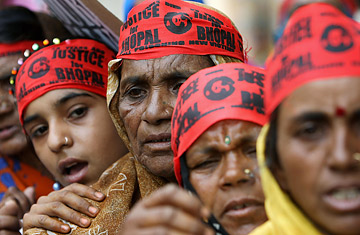
Survivors of the 1984 Bhopal Gas disaster and activists take part in a protest march in New Delhi on May 13, 2008.
The sad truth facing the victims of the natural disasters in China and Burma is that they will soon disappear forever from the headlines and awareness of the international media, inevitably crowded out by more current and pressing stories. The same thing happened to the survivors of Bhopal, where, in December 1984, 40 tons of mostly methyl isocyanate (MIC) gas — one of the deadliest chemicals invented by man — escaped from a Union Carbide factory, immediately killing some 8,000 people, and eventually being linked to 12,000 subsequent deaths. The biggest industrial disaster ever, many times deadlier than the Chernobyl nuclear accident, made headlines around the world, but soon receded into the remote corners of public memory.
But Nafeesa Khan cannot forget the night her life became a living hell. Aged just 18 then, she was married to railways worker Jabbar Khan and expecting their first child. They lived a little over a mile away from the Union Carbide factory, where the gas leak occurred shortly after midnight on December 3, 1984. "We woke up to the sound of screaming," she recalls, "We thought we were breathing fire. There was fire in our eyes and our bellies. People were running helter-skelter, confused, and it seemed the night would never end. By the time it ended, my unborn child was dead."
Like the other survivors, Nafeesa and Jabbar were left enfeebled by exposure to the poison gas, and developed lung, skin and digestive disorders. Too weak to work, Jabbar lost his job. All of the couple's five children — who were not yet born at the time of the disaster — suffer from multiple ailments that doctors blame on their parents' exposure to MIC and other chemicals. "I'd never thought my life would turn out this way," says Nafeesa, "What hurts more is that those responsible for ruining my life have got away."
Two decades on, a criminal case charging Union Carbide and its officials with culpable homicide is still dragging on in a local court in Bhopal, because none of the accused have been available to the court. In 1985, the Indian government had filed a $3.3 billion claim in a U.S. court against Union Carbide, but eventually settled out of court for $470 million — which amounted to less than $500 for each of the 500,000 people harmed by the accident. In addition, Union Carbide never cleaned up the accident site, which continues to leech highly toxic chemicals into the soil and groundwater of the surrounding area, affecting even people born decades after the gas leak. In 2001, Dow Chemicals acquired Union Carbide, but has refused to accept any liability for Bhopal.
For Khan, the injustice continues to rankle, and she joined 50 survivors on a march to New Delhi where they have been staging a sit-in protest for nearly three months now. They are demanding that India's government ensure medical and other help to the thousands of survivors, and that legal action be taken against Dow Chemicals and Union Carbide. Earlier this month, the organization spearheading the march, the International Campaign for Justice for Bhopal (ICJB), released official documents demonstrating that India's Law Ministry shares the legal view that Dow is legally bound to accept the liabilities of Union Carbide.
The ICJB are demanding that Dow pay $1 billion to the survivors, in addition to paying for the cleanup. "But Dow has got the government eating out of its hands," says ICJB's Satinath Sarangi, claiming that a complex web of corruption and politics has been denying the Bhopal survivors of their rightful due. The ICJB claim that Dow's promise to invest $1 billion in India has won over senior ministers and officials to its side, who have been lobbying to have Dow absolved of Union Carbide's liabilities. He displays letters from the Indian ambassador to the U.S. as well as official communication from the offices of Indian officials to this effect. He also points out that Dow's counsel in a case pending in the High Court is also the spokesperson of the ruling Congress party.
Meanwhile, the controversy has slowed Dow's plans to invest in India. In January this year, construction of Dow's proposed R&D facility in Pune in the western Indian state of Maharashtra was stalled after local villagers dug up approach roads to the site. Six Indian Institutes of Technology have refused to work with Dow until it cleans up the accident site and reveals the composition of IMC — a commercial secret — so that survivors can be properly treated. Last year, Dow had to pay a $325,000 penalty to the Securities and Exchange Commission of the U.S. for bribing Indian officials to expedite licenses for four pesticides produced by Dow — one of which, Dursban, is banned in the U.S. Action from the Indian Central Bureau of Investigation may follow. "If Dow were not afraid of the liabilities, it would've invested much more in India," says Sarangi, "The geopolitical logic of its acquisition of Union Carbide was to expand to big markets like India. And we've managed to stop it from doing that."
